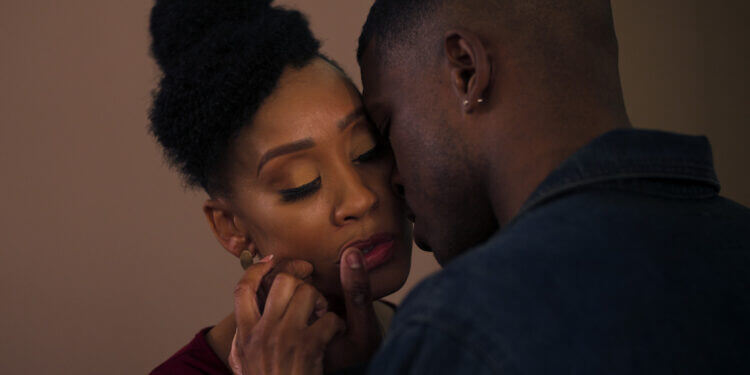From a seductive and intimate poster to the thrill promised by a provocative title like Fatal Seduction, the latest drama from the bustling South Africa-Netflix partnership comes with every intent to capture the untapped carnal attention of Africa. The first few seconds open with a brave montage of everything its audience was hoping for—a warning to those less inclined but an open invitation to what I can only imagine are most Netflix subscribers. The first of its kind I can admit to having watched from Africa, Fatal Seduction is woven with the sole intent to crescendo into synchronies of well-acted, arousingly crafted sex scenes that are self-indulgent and well-spaced within the narrative. The fact that the unnecessary opening montage spills head first, or more accurately, fingers first, into autoeroticism, doubling down on the promise of amatory hedonism.
In the series, Nandi, a stunning professor, shivering from the estranged love of her husband and father to their child, ignites a romance with a younger, multitalented, charming, and charismatic man with a godly physique, and is everywhere she turns, which threatens to collapse her life. It’s a story that has been told and retold a lot of times, from another Netflix release, Dark Desire, the Mexican series that Fatal Seduction is adapted from, to movies such as Jennifer Lopez’s The Boy Next Door, and a story that is bound to be told even more in the future—all with their caveat to try and do something different with it.
Fatal Seduction tries, borrowing a bit too much from its predecessors and taking full advantage of the ease with which sexual tension seethes in such a narrative, allowing it to build without constraints for the first three episodes and later opening itself to pick up the pieces, cresting as a crime drama. The first half relies heavily on coincidence, some a bit too jarring, but once everything is set in motion, the series finds its stride, paced beautifully to shift through episodes, each spiced with enough sensation, tension, and twists to hold the attention of its audience.
Fatal Seduction is beautiful to look at, complemented by cinematography that is not shy of lustfully lingering on South Africa and all its beauty and the direction to squeeze every last drop out of every second of beautiful stars. In front of the camera, the show is bold and beautiful. The colours are radiant, the scenery is breathtaking, the bodies are godly, and the set locations are magnificent. Using all the Netflix budget it could get, the series wastes none of it. It spreads its wings, fully African, South African, and with great attention to setting the right atmosphere for every scene, added to intentional editing and sound design. This is a show that feels like the culmination of a lot of careful and talented individuals coming together to blow some minds and please most.
But even more praise goes to the show’s star: lead actress Kgomotso Christopher (Legacy), who plays Nandi Mahlati. With a narrative that throws her everywhere, from the centre of attention in lecture halls to building up the central emotional core of the show to being the centre of every intense sexual moment the show heavily relies on, she carries it with the experience and sheer talent that elevates the show. Being the only woman receiving all the escapades and fantasies of the men of the show, I found myself more than once recognising the weight these stories must have on such actors. Yet, her morphing seamlessly through the different rhythms of the characters beside her made me appreciate that Kgomotso took the risk and swam through it as gracefully as she did, acting her character out and not as a model that adult industries rely on. Her supporting cast, including her husband Leonard (Thapelo Mokoena) and her steamy lust interest Jacob (Prince Grootboom), are not too scruffy themselves.
With a plot centred around one woman, with her being the focus of every sexual and dramatic progression, a tight-knit intercorrelation of characters had to be maintained, the bedrock of the twists and turns that occur within the show. With a major death of one of the principal characters occurring earlier than in most shows and the depth of the major plotline revolving around the same subject, every character is conveniently placed to keep that lightning in the bottle. This bubbles up some inconsistencies and fillers to keep the plot on track. The coincidences occur a bit too much, and characters not tied to the show, like Nandi’s daughter’s subplot, feel lost within the bigger scope of the story.
As Fatal Seduction winds up and becomes less reliant on its sexual charm, it trips over itself trying to tie everything together while building tension to wrap up the season, with the pacing losing its rhythm and character motives becoming blurred for eventual dramatic confrontations that set up sequels. This has become common with Netflix African shows, which are unable to have a strong finish when they build up like the 10-episode shows of foreign shows but are tied down to 6 or 7 episodes. Even worse for Fatal Seduction, which limits itself to 30-minute episodes.
That being said, I feel less inclined to judge this series on its narrative flaws, but more on the corporeal and surreal escapades the poster and title suggested were the aim, and for those, it doesn’t get any better than Fatal Seduction, at least not from anything that I’ve seen in the continent. And if it does get better, I would love to see it. And for the viewers who lie to themselves, claiming to be there for the plot, it’s not the Titanic, but it’s not half bad either.
Fatal Seduction is now streaming on Netflix.
Enjoyed this article?
To receive the latest updates from Sinema Focus directly to your inbox, subscribe now.











